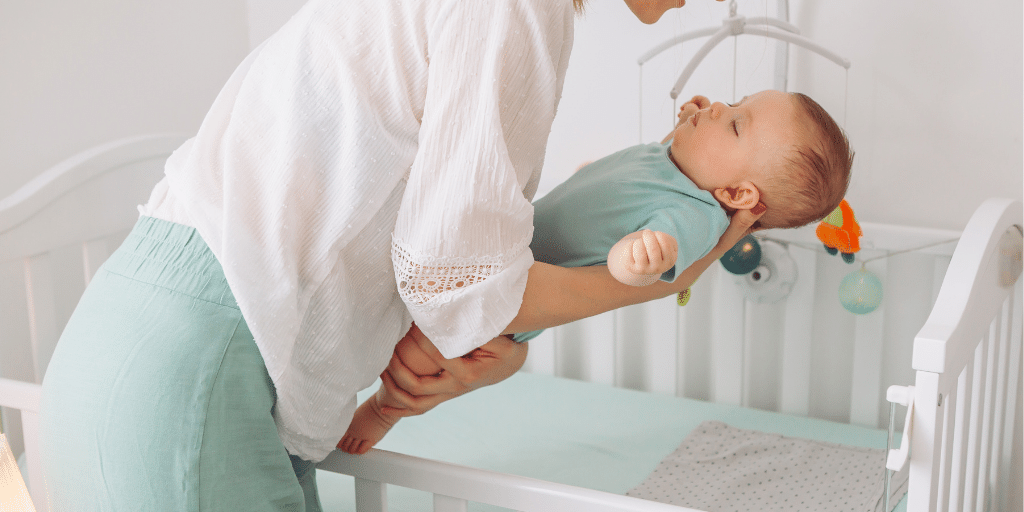When you have a newborn at home, it can be hard to know how to help them establish a good sleep routine but don’t worry – in just a few weeks, you’ll hopefully have it nailed.
We have some great tips for helping establish a sleep routine for your new baby that works for you.
- How do you set a good bedtime routine?
- When is my baby ready to start sleep training?
- What’s the best way to ensure a good night’s sleep?
Newborn Days
When your little one is under six to eight weeks, they will be spending a lot of their time sleeping and you’ll both be getting used to each other. Try to treasure each moment when they are this tiny, have plenty of time for skin-to-skin bonding and try to establish breastfeeding, if that’s what you have chosen. This is a time to just relax and be with your baby and not a time to start trying to impose plans and timetables.
Why is a Bedtime Routine a Good Idea?
A bedtime routine will help your baby to wind down after a busy day eating, sleeping and filling their nappy, and it will also help them to recognise the difference between day and night, making the change from sleeping at any hours of the day to sleeping mostly at night with naps during the day. Gradually, they will recognise the signs that it’s time to go to bed and will be happy to do so. Hopefully, this is a schedule that you’ll be able to use well into childhood.
When is Best to Start?
When your baby reaches about six to eight weeks and you are starting to get used to each other and to your little one’s sleep cues, you can start to establish a sleep routine. You will notice that you can start to predict their patterns a little bit more and so it should be possible to start to introduce an element of routine into their day – and night. If your baby has been sick, was born early or has health problems, you might find that you need to delay setting a sleep routine but do try to start by the time they are six months old. Choose a time when they are in good health and when you have plenty of time to spend with them in the evening.
It may be helpful to record your baby’s sleep patterns for a few days before you get started. Note down the times your baby goes to sleep, and for how long, in a journal like our Baby Log Book. Doing this will help you recognise when their longest sleeps are and what sort of sleep they like; are they an early riser or do they like to snooze in the morning? Soon, you’ll get to recognise their patterns and that can help you form a routine around it.
Getting Started
If you would like your baby’s bedtime to be, for example, 7pm, take some time an hour to half an hour before this to start winding down. Be at home, in a peaceful environment, with the TV and any other distracting electronics turned off and the lights dimmed. Gather all the things you might need for the bedtime routine, so that you won’t have to disturb your baby getting something that you’ve forgotten - and then, off you go.
Sing to Sleep
Play some soothing music or lullabies (some baby monitors have these) in the room your baby is going to sleep in; when they are younger than six months, this should be in your own bedroom, so that you can keep an eye on them and be there for night feeds and nappy changes.
Meanwhile, read your baby a calming book – those that have repeating phrases on each page are ideal, as the familiarity will help them to wind down. Choose a comfortable chair, get settled with your baby on your lap and read in a calm, low voice. You can choose to read before a bath or afterwards, or read before and after – it’s up to you.

Baby's Bathtime
Time for a soothing bath. Have the water at body temperature (always test it with the back of your wrist before lowering your baby in) and add a soothing bath oil or bubbles containing things like lavender, which aids sleep. Playing in the bath is fine but keep it low key and not too exciting. Pat dry with a warm towel and dress your baby in his bed clothes – a baby sleeping bag is ideal, as it’s always at the right temperature, can’t be kicked off in the night like sheets and blankets and allows easy access for nappy changes. Some babies also like a massage after their bath.
Nighttime Feed
Next read another calming book or sing a few lullabies to your baby. Give them their night time feed and when they have been winded and are sleepy but not yet asleep, lower them gently into the crib or cot, singing and soothing them as you do so. The idea is to try to get them to fall asleep by themselves.
Be Consistent
Try to stick to the same routine each night, doing things in the same order and at the same time of day. Don’t be too precious if your plans go awry at times, as long as overall you have a soothing route to bedtime snoozing. If it works, you may find that you can also use these sleep cues to help your baby nap during the day.
Dream Feed
When you go to bed yourself later on, you may want to wake your baby for one more feed to ensure you get as long a patch of sleep as possible – unless you’re so exhausted you’ve gone to bed with your baby at 7!
When Things Go Wrong
Sometimes something comes along that interrupts your plans such as colic, illness, holidays or family events. This may interfere with your baby’s sleep patterns so go with it and when your little one is feeling better, aim for your routine again.
Hopefully some, or all, of these tips will help, but do pop over to SnoozeShade on Instagram as we follow lots of great Baby Sleep experts over there and often share their posts, as well as doing live Q&A sessions too!
Further Reading:
Baby Sleep Patterns - What You Need to Know
The Importance of a Good Sleep Routine for the Whole Family
Foods That Help Your Little One Sleep




